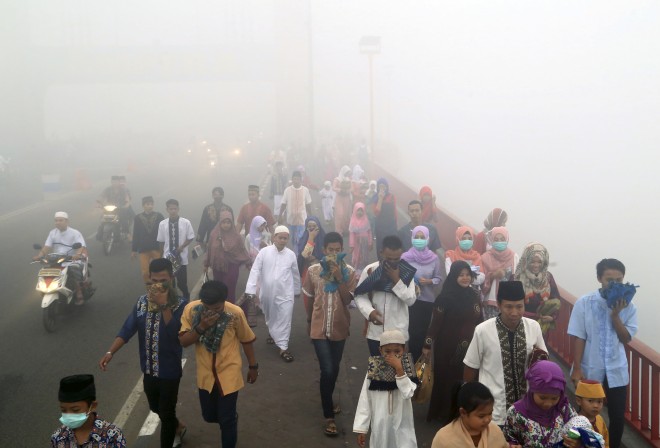Malaysia air pollution spikes due to Indonesian smoke

Muslims cover their mouths and noses from the haze from wildfires as they walk to attend a morning prayer marking the Eid al-Adha in Palembang, South Sumatra, Indonesia, Thursday, Sept. 24, 2015. AP
KUALA LUMPUR — Air pollution in Malaysia’s capital spiked to “very unhealthy” levels Sunday as acrid smoke billowing from Indonesian agricultural fires intensified, in an environmental crisis that is fraying regional tempers.
Pollution readings soared past the 200-point level Sunday morning in the Malaysian government’s hourly air-quality index, a threshold that triggers automatic school closures during weekdays.
As the haze built up in Malaysia on Saturday, an airport just outside Kuala Lumpur closed temporarily in the afternoon as visibility dropped to less than 400 meters (yards).
The closure forced at least 20 flights to be cancelled, according to Malaysian media reports, and followed Singapore’s shuttering of schools on Friday as air there worsened to “hazardous” levels.
Parts of Indonesia, Malaysia and Singapore have been shrouded for weeks in a choking smoke haze from tinder-dry parts of Indonesia’s Sumatra island.
Article continues after this advertisementThe haze crisis — the worst since mid-2013 — grips the region nearly every year during the dry season, when agricultural land is illegally cleared by burning.
Article continues after this advertisementIndonesia has faced pressure from its neighbors to address the problem since it first emerged about 20 years ago.
But the issue has persisted, especially as plantations have expanded, driven in large part by rising global demand for palm oil, a key ingredient in a vast range of everyday consumer products.
Malaysian skies have been a smoky grey for most of the past month, and authorities on September 15 ordered schools closed in Kuala Lumpur and neighboring states.
Singapore Foreign Minister K. Shanmugam on Friday lashed out at what he called “shocking statements” by senior Indonesian officials perceived as making light of the problem.
Haze levels in Singapore had improved by Sunday, dropping below the “unhealthy” mark.
Indonesian authorities have indicated the problem may not clear up anytime soon.
National Disaster Management Agency spokesman Sutopo Purwo Nugroho said Saturday that “fires continue to rage” despite a push to extinguish the blazes on farm expanses and peatlands that has included the deployment of military personnel.
He said new fires were cropping up, while those that were previously extinguished had re-emerged in peatlands or had been deliberately re-ignited.
He added that pollution readings in several Indonesian cities were at hazardous levels, and that nearly 168,000 people in affected areas has sought medical treatment for respiratory problems.
Indonesia had earlier declared a state of emergency in Sumatra’s hard-hit Riau province.
RELATED STORIES
Malaysia to begin cloud-seeding as schools shut due to haze